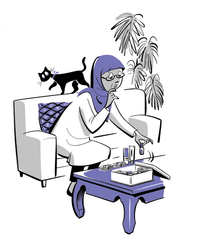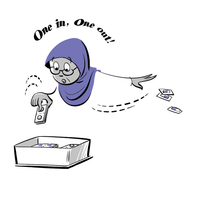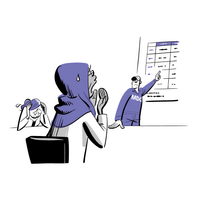Hanna’s daughter dropped her off outside the surgery, early as always. The main entrance was blocked by a large dark blue van marked in bold white lettering: NAS. Hanna adjusted her glasses but couldn’t make out what the letters stood for. She hurried round to a side entrance that few patients seemed to know about.
Once inside it was chaos. The receptionists were not sitting in their usual places. Instead, they were moving quickly around the waiting area, wearing headsets over their ears and signing people in for appointments using clipboards and pens. They chatted with the patients, just like they usually did, but Hanna could sense change in the air. One of them took Hanna’s scribbled note - her request for her regular medication. “Just this once” the receptionist said. The letter box that she usually dropped it into had vanished.
There were some other people – a whole army of them – whom Hanna did not recognise. Men and women dressed in dark blue boilersuits with white caps pulled low over their faces. She saw the same logo – NAS – on their backs. The boilersuit people were dragging heavy boxes to and from their van. They moved quickly and silently, not a word spoken. Some were ripping name plates off the consulting room doors, throwing them into black sacks, and replacing them with blue and white numbers instead. Tatty cardboard boxes stuffed with old wires, computer keyboards and screens were moving out. Sealed, shiny blue and white plastic crates were moving in.
Ah, finally the surgery is getting a new computer system thought Hanna. Thank goodness for that. The receptionists were always grumbling about the old system. It was slow. It crashed. It failed. And ever since paper prescriptions were banned, it had developed a mysterious habit of sending the electronic versions to the wrong pharmacy. Hanna had been caught out by this more than once. It was very easy to be caught out by some of the changes that were happening at the surgery. She used to find it so reassuring to leave the building clutching her paper prescription in her hand. But maybe these invisible prescriptions are better overall? Perhaps someone is keeping an eye on what the doctors are prescribing to patients and making sure they do the right thing?


